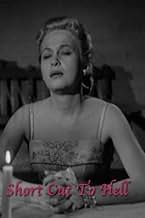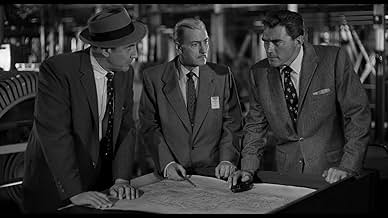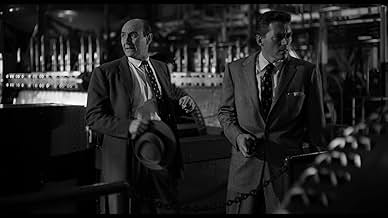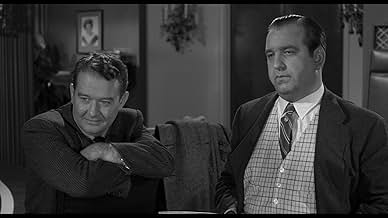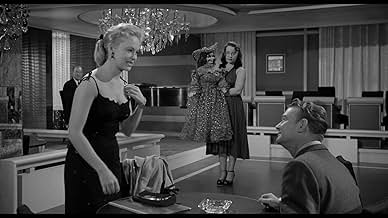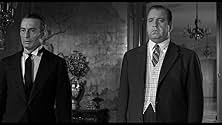IMDb-BEWERTUNG
6,0/10
451
IHRE BEWERTUNG
Füge eine Handlung in deiner Sprache hinzuA hired killer's latest contract goes awry when he's paid with stolen money and finds himself embroiled in a deadly cat-and-mouse game with those who hired him.A hired killer's latest contract goes awry when he's paid with stolen money and finds himself embroiled in a deadly cat-and-mouse game with those who hired him.A hired killer's latest contract goes awry when he's paid with stolen money and finds himself embroiled in a deadly cat-and-mouse game with those who hired him.
Larry Arnold
- Commuter
- (Nicht genannt)
Roscoe Ates
- Road Driver
- (Nicht genannt)
Joe Bassett
- Patrolman
- (Nicht genannt)
Jacqueline Beer
- Waitress
- (Nicht genannt)
Paul Bradley
- Train Passenger
- (Nicht genannt)
James Cagney
- Self - Pre-credits sequence
- (Nicht genannt)
Douglas Evans
- Mr. Henry
- (Nicht genannt)
Joseph Forte
- Ticket Seller
- (Nicht genannt)
Milton Frome
- LAPD Captain
- (Nicht genannt)
James Gonzalez
- Train Passenger
- (Nicht genannt)
Empfohlene Bewertungen
Robert Ivers and Georgeann Johnson never quite had the careers that were predicted for them in the introduction to this film by their director. But both give a reasonably competent road show adaption of the Paramount classic This Gun For Hire. Short Cut To Hell also stars William Bishop in the role of the San Francisco cop played originally by Robert Preston who is on the trail to Los Angeles looking for a killer.
The whole wartime angle in This Gun For Hire is dropped for this 1957 film. Instead it's a contract killing of civil servant Peter Baldwin who is about to expose some shady dealings in building contracting. But as in the original he's paid off in hot money from a faked robbery with serial numbers duly recorded and reported to the police.
For the most part the film follows the plot of This Gun For Hire even using a lot of the same lines. Jacques Aubuchon plays the Laird Cregar part of the fixer and he has the same aversion against seeing any of the violence he pays for.
A.C. Lyles who later became famous for producing all those B westerns with past their prime players produced this film and got none other than James Cagney to direct it in his only credit in that department. Cagney never went behind the camera again.
But I doubt even with the original cast of This Gun For Hire that he could have improved on what Frank Tuttle did in 1942.
The whole wartime angle in This Gun For Hire is dropped for this 1957 film. Instead it's a contract killing of civil servant Peter Baldwin who is about to expose some shady dealings in building contracting. But as in the original he's paid off in hot money from a faked robbery with serial numbers duly recorded and reported to the police.
For the most part the film follows the plot of This Gun For Hire even using a lot of the same lines. Jacques Aubuchon plays the Laird Cregar part of the fixer and he has the same aversion against seeing any of the violence he pays for.
A.C. Lyles who later became famous for producing all those B westerns with past their prime players produced this film and got none other than James Cagney to direct it in his only credit in that department. Cagney never went behind the camera again.
But I doubt even with the original cast of This Gun For Hire that he could have improved on what Frank Tuttle did in 1942.
Towards the end of Short Cut to Hell, with the two principal characters holed up in an abandoned underground storage bunker and the police cars massed outside, there's a long quotation from the doom-freighted score Miklos Rosza wrote for Double Indemnity. It's one of several arresting details the movie provides (another is a newspaper from the previous decade, with the headline 'Allies Cross Siegfried Line'), details that pique interest but go nowhere in attempting to satisfy curiosity.
Short Cut to Hell is an all but forgotten movie but a noteworthy one nonetheless, if only as the only title James Cagney ever directed. Night of the Hunter it's not (the sole directorial effort of Charles Laughton), but another point of engagement is in its being a remake of the 1942 Alan Ladd/Veronica Lake vehicle This Gun for Hire, drawn from the Graham Greene 'entertainment' of that name.
The Ladd/Lake allure didn't last into a new millennium (who knew?), but in 1957 both of them were still reasonably active, their less than glamorous (all right, alcoholic) endgames still a few years, or decades, off. Cagney chose to update them using actors without much in the way of either past or future.
In the Ladd role of the icy, isolated killer-for-hire, Robert Ivers is little more than a trenchcoat and a topper, skin and bones, who brings to mind an unlikely amalgam of Elisha Cook Jr. and James Dean. Finding himself set up through marked bills, after carrying out the two brutal murders contracted by pompous 'fatso' (Jacques Aubuchon, whose indulgences are pretty young things and peppermint patties), he eludes police, taking as hostage Georgann Johnson, a lounge singer engaged to police detective William Bishop.
Johnson proves a game gal, but in the wrong way. She has a way with a wisecrack, but it's not in the flirtatious Veronica Lake way (nor that of Lauren Bacall or Gloria Grahame); the spin she gives is more in the Eve Arden-ish, vinegar-virgin mode, less seductive than matey, even matronly. So the chemistry between captor and captive (our old friend The Stockholm Syndrome) rarely reaches reactive force. (Nor, for that matter, do the reactions between Johnson and Bishop.)
Notwithstanding its unknown cast, Short Cut to Hell doesn't have the look or feel of a B-movie, and Cagney keeps a good pace and an acceptable amount of tension (a few quite brutal scenes help to quicken the pulse as well). It's not quite clear why Cagney chose this material to direct, and he makes (or had to accept) some less than ideal choices, but he'd worked in movies long enough to insure that the movie he directed was brisk and absorbing, a better little movie than its obscurity might suggest.
Short Cut to Hell is an all but forgotten movie but a noteworthy one nonetheless, if only as the only title James Cagney ever directed. Night of the Hunter it's not (the sole directorial effort of Charles Laughton), but another point of engagement is in its being a remake of the 1942 Alan Ladd/Veronica Lake vehicle This Gun for Hire, drawn from the Graham Greene 'entertainment' of that name.
The Ladd/Lake allure didn't last into a new millennium (who knew?), but in 1957 both of them were still reasonably active, their less than glamorous (all right, alcoholic) endgames still a few years, or decades, off. Cagney chose to update them using actors without much in the way of either past or future.
In the Ladd role of the icy, isolated killer-for-hire, Robert Ivers is little more than a trenchcoat and a topper, skin and bones, who brings to mind an unlikely amalgam of Elisha Cook Jr. and James Dean. Finding himself set up through marked bills, after carrying out the two brutal murders contracted by pompous 'fatso' (Jacques Aubuchon, whose indulgences are pretty young things and peppermint patties), he eludes police, taking as hostage Georgann Johnson, a lounge singer engaged to police detective William Bishop.
Johnson proves a game gal, but in the wrong way. She has a way with a wisecrack, but it's not in the flirtatious Veronica Lake way (nor that of Lauren Bacall or Gloria Grahame); the spin she gives is more in the Eve Arden-ish, vinegar-virgin mode, less seductive than matey, even matronly. So the chemistry between captor and captive (our old friend The Stockholm Syndrome) rarely reaches reactive force. (Nor, for that matter, do the reactions between Johnson and Bishop.)
Notwithstanding its unknown cast, Short Cut to Hell doesn't have the look or feel of a B-movie, and Cagney keeps a good pace and an acceptable amount of tension (a few quite brutal scenes help to quicken the pulse as well). It's not quite clear why Cagney chose this material to direct, and he makes (or had to accept) some less than ideal choices, but he'd worked in movies long enough to insure that the movie he directed was brisk and absorbing, a better little movie than its obscurity might suggest.
Peppermint-loving Jacques Aubuchon hires Robert Ivers to kill a couple of people, then pays him off with hot money. So Ivers boards the train to track down the guy who stiffed him. Seated next to Georgann Johnson, a singer who's heading to LA to work ina night club, he lifts a five-dollar bill from her. She catches it and demands her money back, then notices how hungry he is and splits a sandwich with him. Aubuchon is on the train, sees Iver, and calls the cops. Ivers forces Miss Johnson off the train with him, but they part company.... although their paths will soon cross again.
How did Jimmy Cagney come to make his sole movie as director with this remake of 1942's THIS GUN FOR HIRE? Good friend A. C. Lyles was producing it as his first picture and asked him to. It's not particularly distinguished, but then, neither was the first screen version. It's much more open in its sexuality, with a long moving shot focused on Yvette Vickers' rear as she sashays around Ivers' flop. Everyone is good, but no one is great, and lightning didn't strike the way it did with the first movie.
How did Jimmy Cagney come to make his sole movie as director with this remake of 1942's THIS GUN FOR HIRE? Good friend A. C. Lyles was producing it as his first picture and asked him to. It's not particularly distinguished, but then, neither was the first screen version. It's much more open in its sexuality, with a long moving shot focused on Yvette Vickers' rear as she sashays around Ivers' flop. Everyone is good, but no one is great, and lightning didn't strike the way it did with the first movie.
An icy hit-man seeks revenge after being double-crossed by his employer.
Catch those early scenes with an over-heated Vickers (Daisy). I don't know what director Cagney told her, but she does everything except kiss the camera. Given the generally slack results, I can see why Cagney never again directed. The movie itself is spotty, at best, with an erratic script and uneven acting. Johnson (Glory) and Aubuchon (Barhwell) are fine; however, lead actor Ivers (Kyle) lacks the gravitas to carry off the merciless hit-man. He looks a little like Cagney, but is a long way from the latter's compelling charisma. (Note how the physically slight Ivers wears a bulky trenchcoat in most scenes.) Of the two leads, it's really Georgann Johnson who has the strong presence. Note too, the subtle hints that Bahrwell might well be gay, rather daring innuendo for the time.
Cagney's pretty good at staging. The industrial plant scenes are both eye-catchers and ominously suggestive. And I'm wondering whose lavish Hollywood estate was used for the finale. Speaking of the estate, the showdown is a lot tamer than I expected, given Bahrwell's slimy character. And shouldn't overlook the two execution scenes that are quite graphic, for the time. However, there are also two contrived implausibles—Glory donning Kyle's decoy outfit even though she's certain to get shot; plus, thug Nichols' (Vye) recovering quickly with hardly a mark after a savage beating. Neither is well thought out.
Not surprisingly, Johnson went on to a very respectable TV career, while it looks like Ivers never again had a lead role. Fortunately, Cagney went back to what he did best—acting. All in all, the movie fails to have any lasting impact despite the strong premise. It's definitely not the best version of novelist Greene's This Gun For Hire.
Catch those early scenes with an over-heated Vickers (Daisy). I don't know what director Cagney told her, but she does everything except kiss the camera. Given the generally slack results, I can see why Cagney never again directed. The movie itself is spotty, at best, with an erratic script and uneven acting. Johnson (Glory) and Aubuchon (Barhwell) are fine; however, lead actor Ivers (Kyle) lacks the gravitas to carry off the merciless hit-man. He looks a little like Cagney, but is a long way from the latter's compelling charisma. (Note how the physically slight Ivers wears a bulky trenchcoat in most scenes.) Of the two leads, it's really Georgann Johnson who has the strong presence. Note too, the subtle hints that Bahrwell might well be gay, rather daring innuendo for the time.
Cagney's pretty good at staging. The industrial plant scenes are both eye-catchers and ominously suggestive. And I'm wondering whose lavish Hollywood estate was used for the finale. Speaking of the estate, the showdown is a lot tamer than I expected, given Bahrwell's slimy character. And shouldn't overlook the two execution scenes that are quite graphic, for the time. However, there are also two contrived implausibles—Glory donning Kyle's decoy outfit even though she's certain to get shot; plus, thug Nichols' (Vye) recovering quickly with hardly a mark after a savage beating. Neither is well thought out.
Not surprisingly, Johnson went on to a very respectable TV career, while it looks like Ivers never again had a lead role. Fortunately, Cagney went back to what he did best—acting. All in all, the movie fails to have any lasting impact despite the strong premise. It's definitely not the best version of novelist Greene's This Gun For Hire.
This is the only film James Cagney directed, and for a first-time effort, this remake of THIS GUN FOR HIRE is not too shabby. Cagney supposedly made the film as a favor to producer A.C. Lyles, and he did not really intend to pursue a career as a director. While it may not be up to the original, the film still has a good deal of Cagney-esque energy, and enough suspense to sustain viewer interest.
Actress Georgann Johnson is cast in the Veronica Lake role, and she applies a serious amount of realism. At one point, she has to walk down the aisle of a train, and she does it very subtly as if her equilibrium is off-balance, which if you think about it, it should be. How come other actors do not walk realistically on trains, planes and other fast-moving transportation in movies? Maybe they should consult Miss Johnson for pointers.
Actress Georgann Johnson is cast in the Veronica Lake role, and she applies a serious amount of realism. At one point, she has to walk down the aisle of a train, and she does it very subtly as if her equilibrium is off-balance, which if you think about it, it should be. How come other actors do not walk realistically on trains, planes and other fast-moving transportation in movies? Maybe they should consult Miss Johnson for pointers.
Wusstest du schon
- WissenswertesJames Cagney's only directorial effort.
- Zitate
[Kyle just told Glory that he's a professional killer]
Glory Hamilton: Is there anything you like about yourself?
Kyle: Yeah. I never miss.
- VerbindungenReferenced in Here's Lucy: Lucy and Carol Burnett (1971)
- SoundtracksI'm in the Mood for Love
(uncredited)
Music by Jimmy McHugh
Lyrics by Dorothy Fields
Performed by Danny Lewis
Top-Auswahl
Melde dich zum Bewerten an und greife auf die Watchlist für personalisierte Empfehlungen zu.
- How long is Short Cut to Hell?Powered by Alexa
Details
- Erscheinungsdatum
- Herkunftsland
- Sprache
- Auch bekannt als
- Short Cut to Hell
- Drehorte
- Produktionsfirma
- Weitere beteiligte Unternehmen bei IMDbPro anzeigen
- Laufzeit1 Stunde 29 Minuten
- Farbe
- Seitenverhältnis
- 1.85 : 1
Zu dieser Seite beitragen
Bearbeitung vorschlagen oder fehlenden Inhalt hinzufügen


